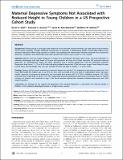| dc.contributor.author | Ertel, Karen Ann | |
| dc.contributor.author | Koenen, Karestan | |
| dc.contributor.author | Rich-Edwards, Janet Wilson | |
| dc.contributor.author | Gillman, Matthew William | |
| dc.date.accessioned | 2011-04-22T21:14:14Z | |
| dc.date.issued | 2010 | |
| dc.identifier.citation | Ertel, Karen A., Karestan C. Koenen, Janet W. Rich-Edwards, and Matthew W. Gillman. 2010. Maternal depressive symptoms not associated with reduced height in young children in a US prospective cohort study. PLoS ONE 5(10): e13656. | en_US |
| dc.identifier.issn | 1932-6203 | en_US |
| dc.identifier.uri | http://nrs.harvard.edu/urn-3:HUL.InstRepos:4874590 | |
| dc.description.abstract | Background: Shorter stature is associated with greater all cause and heart disease mortality, but taller stature with increased risk of cancer mortality. Though childhood environment is important in determining height, limited data address how maternal depression affects linear growth in children. We examined the relationships between antenatal and postpartum depressive symptoms and child height and linear growth from birth to age 3 years in a U.S. sample. Methods: Subjects were 872 mother-child pairs in Project Viva, a prospective pre-birth cohort study. The study population is relatively advantaged with high levels of income and education and low risk of food insecurity. We assessed maternal depression at mid-pregnancy (mean 28 weeks' gestation) and 6 months postpartum with the Edinburgh Postnatal Depression Scale (score > = 13 on 0–30 scale indicating probable depression). Child outcomes at age 3 were height-for-age z-score (HAZ) and leg length. HAZ was also available at birth and ages 6 months, 1, 2, and 3 years. Findings: Seventy (8.0%) women experienced antenatal depression and 64 (7.3%) experienced postpartum depression. The mean (SD) height for children age 3 was 97.2 cm (4.2), with leg length of 41.6 cm (2.6). In multivariable linear regression models, exposure to postpartum depression was associated with greater HAZ (0.37 [95% confidence interval: 0.16, 0.58]) and longer leg length (0.88 cm [0.35, 1.41]). The relationship between postpartum depression and greater HAZ was evident starting at 6 months and continued to age 3. We found minimal relationships between antenatal depression and child height outcomes. Conclusion: Our findings do not support the hypothesis that maternal depression is associated with reduced height in children in this relatively advantaged sample in a high-income country. | en_US |
| dc.language.iso | en_US | en_US |
| dc.publisher | Public Library of Science | en_US |
| dc.relation.isversionof | doi://10.1371/journal.pone.0013656 | en_US |
| dc.relation.isversionof | doi:10.1371/journal.pone.0013656 | en_US |
| dc.relation.hasversion | http://www.ncbi.nlm.nih.gov/pmc/articles/PMC2965089/pdf/ | en_US |
| dash.license | LAA | |
| dc.subject | mental health | en_US |
| dc.subject | mood disorders | en_US |
| dc.subject | pediatrics and child health | en_US |
| dc.subject | child development | en_US |
| dc.subject | public health and epidemiology | en_US |
| dc.subject | social and behavioral determinants of health | en_US |
| dc.title | Maternal depressive symptoms not associated with reduced height in young children in a US prospective cohort study | en_US |
| dc.type | Journal Article | en_US |
| dc.description.version | Version of Record | en_US |
| dc.relation.journal | PLoS ONE | en_US |
| dash.depositing.author | Ertel, Karen Ann | |
| dc.date.available | 2011-04-22T21:14:14Z | |
| dash.affiliation.other | SPH^Society Human Development and Health | en_US |
| dash.affiliation.other | SPH^Epidemiology | en_US |
| dash.affiliation.other | HMS^Medicine-Brigham and Women's Hospital | en_US |
| dash.affiliation.other | HMS^Population Medicine | en_US |
| dash.affiliation.other | SPH^Nutrition | en_US |
| dc.identifier.doi | 10.1371/journal.pone.0013656 | * |
| dash.contributor.affiliated | Ertel, K | |
| dash.contributor.affiliated | Koenen, Karestan | |
| dash.contributor.affiliated | Rich-Edwards, Janet | |
| dash.contributor.affiliated | Gillman, Matthew | |


